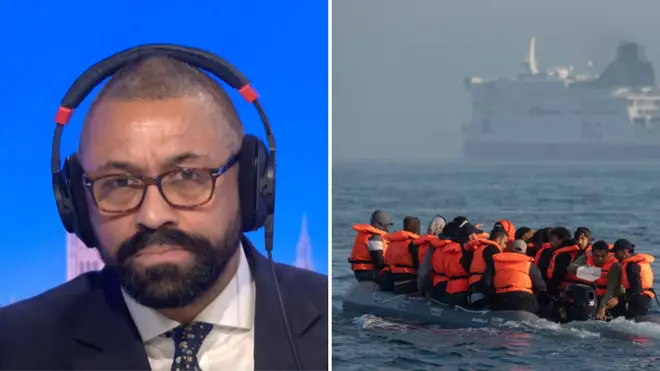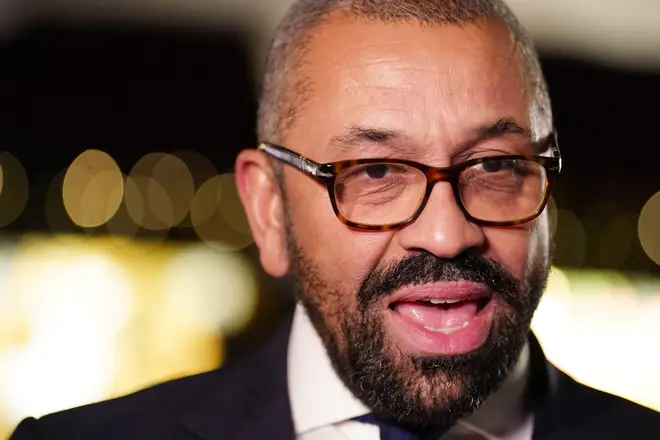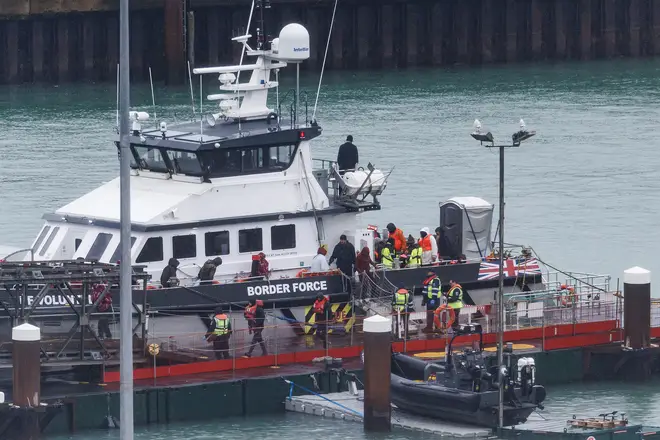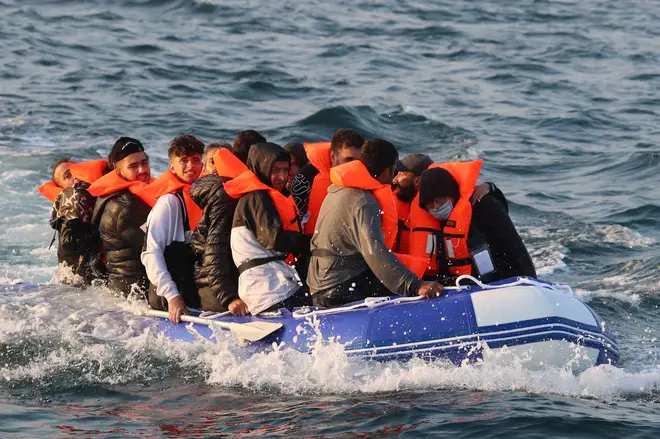
Paul Brand 10am - 12pm
2 January 2024, 08:29

The government aims to slash the number of small boat crossings across the English Channel to zero this year, the Home Secretary has told LBC.
The perilous Channel crossings - which the government hopes will be deterred under threat of being flown to Rwanda - were down 36% in 2023 compared to the year before.
Asked by LBC's Nick Ferrari how much he was aiming to reduce the number of journeys this year, James Cleverly said: "My target is to bring it down to zero. I'm completely committed...
"My target is to reduce it to zero, to stop the boats, and I'm unambiguous about that."
The crossings were down by 45% in the second half of last year compared to the same period in 2022, and by 64% in the final quarter of 2023 compared to the last three months of 2022.

James Cleverly insists legacy asylum backlog has been cleared
This does not quite fulfil Mr Sunak's pledge to stop the boats, but it shows "the trend is heading in the right direction," Mr Cleverly said.
Some people claim that worse weather was largely behind the reduced number of boat crossings, but Mr Cleverly said that the number of good sailing days in 2023 was roughly the same as in 2022.
"Those really significant reductions are because of the work we're doing with France, with Romania, with Germany, with Albania, and others, breaking the supply chain for things like boats and engines," he said.
A total of 246 people smugglers were also arrested throughout the year.
Mr Cleverly added: "So we're going to continue doing things like that, and of course, bring forward Rwanda, which will have a deterrent effect - that's how we intend to stop the boats."
The government is still working to bring back its Rwanda plan, after the Supreme Court agreed it should be blocked because the East African country is not safe for asylum seekers to go.

Read more: Talks with airlines to take migrants to Rwanda have not started, James Cleverly admits
Judges were especially concerned that migrants risked being sent to their old countries, making them vulnerable to persecution - something the government is trying to address with its new bill and a revamped agreement with Kigali.
And it pointed to agreements with countries like France, Albania and Turkey relating to illegal migration that were signed last year.
A statement said: "The UK continues to urge genuine asylum seekers to claim asylum in the first safe country they reach, and the government will continue to target, disrupt and dismantle people smuggling gangs, who continue to lure vulnerable people to undertaking the deadly journey across the Channel."
Mr Cleverly said earlier: "While illegal entries across Europe are going up, the number of people coming into the UK illegally is going down. This is a significant achievement, but the job is far from over.
"I will continue to do everything possible to stop the boats. No people smuggler will be safe, we will work with law enforcement partners and Governments across the world who want to tackle this threat and ensure that British taxpayer money is not wasted on people trying to abuse our generosity."

It comes as ministers also announced on Monday that officials had cleared more than 112,000 asylum seekers' cases in 2023, after Mr Sunak had made a promise a year earlier to "abolish" the backlog of claims made before June 2022.
The government said on Monday that it had "delivered" on the pledge, but Labour pointed out that thousands of people were still waiting for a final decision.
This drive came after concerns about taxpayers paying for their accommodation in hotels while their claims are accessed.
The government spent around £3.6 billion on asylum support in 2022-23, almost double the amount in the previous year.
Mr Cleverly told LBC that cutting the number of small boat crossings would also reduce the number of people needed to process asylum claims.
He added that the government was "committed" to "never allowing a backlog to develop like that again," adding: "We've significantly increased the speed of processing."
Mr Cleverly said: "That's why those people who were in asylum hotels no longer need to be in those hotels, which is why we're in the process of handing 50 of those hotels back to private use that we had to use for asylum accommodations."
But the Home Secretary was unable to give an up-to-date number of asylum seekers still staying in hotels.

The Conservatives' figures on asylum processing showed that 92,000 applications made before June 2022 needed to be processed, and decisions have been made on over 86,000 cases. A further batch of around 20,000 more recent applications were also processed.
But the Home Office admitted: "4,500 complex cases have been highlighted that require additional checks or investigation for a final decision to be made".
These cases often involve "asylum seekers presenting as children - where age verification is taking place; those with serious medical issues; or those with suspected past convictions, where checks may reveal criminality that would bar asylum", the department added.
Around 17,000 people withdrew their applications for asylum in the year leading up to September 2023, after "not engaging with the system".
Officials made the "highest annual number of substantive decisions in a year since 2002", the Home Office said. The grant rate for final asylum decisions in 2023 stood at 67%, lower than in 2022 and 2021 (76% and 72%).
But Labour's shadow immigration minister Stephen Kinnock said no "slicing or renaming the figures can disguise" that the asylum backlog had "rocketed under the Tories".
He added: "Even their claims to have cleared the so-called 'legacy backlog' are false. Over 4,000 claims are unresolved and a disturbing 17,000 asylum seekers have simply been 'withdrawn' by the Tories from this legacy backlog, with ministers seeming to have no idea where they are and whether they are reapplying or disappearing into the underground economy."
Enver Solomon, chief executive of the Refugee Council, said progress had been made but it is "misleading for the Government to claim that the legacy backlog has been cleared as there are thousands still waiting for a decision".
Mr Solomon added: "The reality is that the Home Office has lost track of too many people who have been removed from the asylum process."
Rishi Sunak said: "I am determined to end the burden of illegal migration on the British people.
"That is why we have taken action to stop the boats, return hotels to their local communities, and deter those wanting to come here illegally from doing so.
"By clearing the legacy asylum backlog, deciding more than 112,000 cases, we are saving the taxpayer millions of pounds in expensive hotel costs, reducing strain on public services and ensuring the most vulnerable receive the right support.
"But we cannot be complacent, which is why I am focused on delivering on my commitment to stop the boats and get flights off the ground to Rwanda."

Watch Again: Nick Ferrari is joined by Home Secretary James Cleverly | 02/01/24
Speaking to LBC's Nick Ferrari at Breakfast, Lucy Moreton, Professional Officer at ISU, the Union for Borders, Immigration and Customs, and Former Chief Immigration Officer at the UK Border Force said this was a "clever use of statistics by the government."
She also revealed "bizarrely" the defeat of the Rwanda plan helped clear a large amount of the backlog "because the caseworkers that were dedicated to deal with operationalising that, and removing individuals to Rwanda - all very experienced long-serving officers - were able to be redeployed to assist with the backlog."